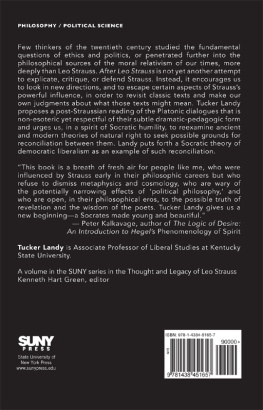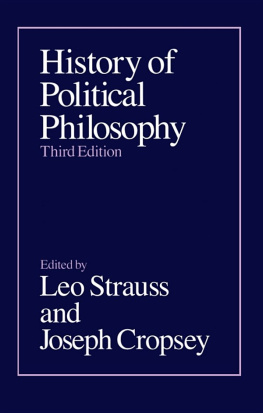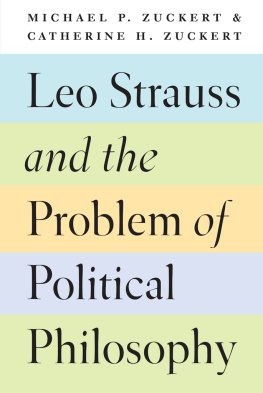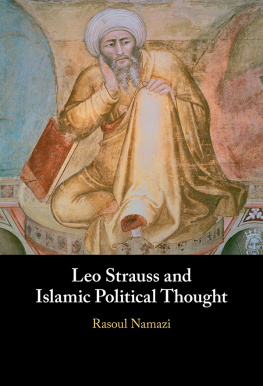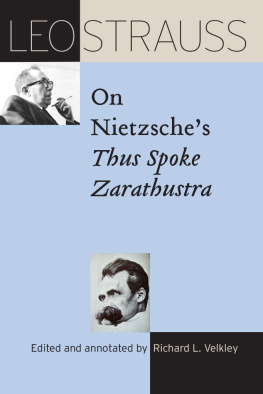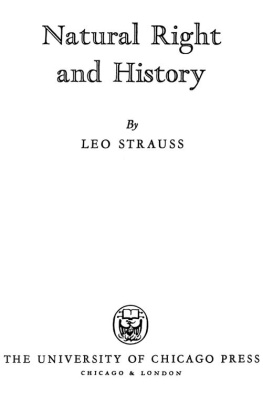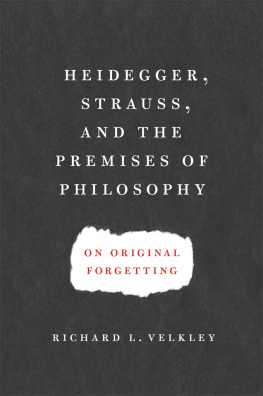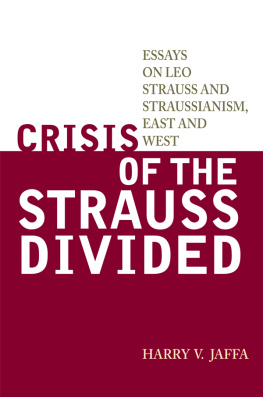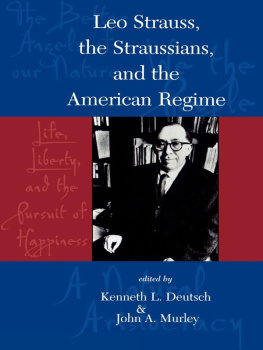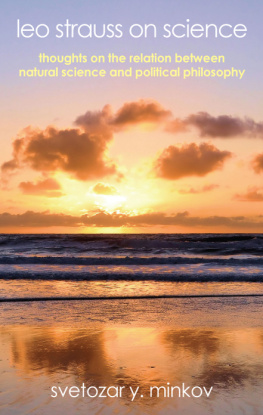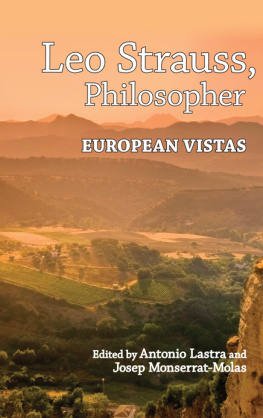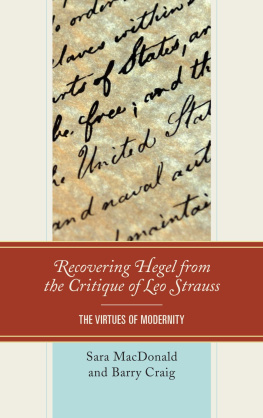After Leo Strauss
SUNY series in the Thought and Legacy of Leo Strauss
Kenneth Hart Green, editor
After Leo Strauss
New Directions in Platonic Political Philosophy
TUCKER LANDY
Published by State University of New York Press, Albany
2014 State University of New York
All rights reserved
Printed in the United States of America
No part of this book may be used or reproduced in any manner whatsoever without written permission. No part of this book may be stored in a retrieval system or transmitted in any form or by any means including electronic, electrostatic, magnetic tape, mechanical, photocopying, recording, or otherwise without the prior permission in writing of the publisher.
For information, contact State University of New York Press, Albany, NY
www.sunypress.edu
Production by Eileen Nizer
Marketing by Michael Campochiaro
Library of Congress Cataloging-in-Publication Data
Landy, Tucker, 1957
After Leo Strauss : new directions in platonic political philosophy / Tucker Landy.
pages cm.
Includes bibliographical references and index.
ISBN 978-1-4384-5165-7 (hardcover : alk. paper)
1. Political sciencePhilosophy. 2. Strauss, LeoPolitical and social views. I. Title.
JA71.L238 2014
320.01dc23
2013025550
10 9 8 7 6 5 4 3 2 1
Contents
Acknowledgments
I would like to thank, first, my wife, with whom I have shared all my thoughts, sometimes stretching her patience. Every step forward happened with encouragement from her. She has proofread much of my prose and made several improvements. Next, my colleagues in the Whitney Young School of Honors and Liberal Studies at Kentucky State University, every one of whom have directly influenced my thinking on the questions addressed by this book. They might recognize in these pages some of their own thoughts, which I can no longer distinguish from my own. Dr. Ronald Mawby, in particular, has been a philosophical friend, listening often to my rants and helping me shape them into something like reasoned arguments. Dr. Thomas McPartland, director of the school, has been in many ways a postdoctoral teacher to me and provided unstinting encouragement to think and write. My students, during the twenty-five years I have taught in the honors program, are the ones who most often shook me out of my old habits of reading. There is no education like the fresh perspective and startling questions of an undergraduate on the Great Books, which we professors too readily think we understand well enough. Dr. Scott Lee of the Association of Core Texts and Courses aided me at a crucial moment in the development of the manuscript. Two anonymous reviewers for the SUNY Press were extremely helpful in correcting errors.
CHAPTER 1
Introduction
Rethinking Leo Strauss
The title of this book is intended to suggest that those of us who have benefited from the work of Leo Strauss should look for ways to move beyond it, but also that moving beyond it is not as simple as abandoning it. Others, of course, will wonder why we should bother with Leo Strauss at all. For those readers, let me begin by summarizing as succinctly as I can why I think Leo Strauss is so important for understanding ourselves and our world: To my knowledge, no thinker of the twentieth century has examined more deeply the best thinking on the fundamental questions of ethics and politics and the reasons for the current state of affairs, which I would characterize, following Strauss, as a lack of confidence in Western political institutions and a half-hearted moral relativism. This introduction sketches out which aspects of Strausss work I believe should be maintained, and also which might be respectfully reconsidered.
There are undoubtedly many different paths through the issues and controversies surrounding Leo Strauss. I believe, without having done any surveys, that my own path was not exceptional. In any case, it is a path I know fairly well, and it seems the best way to explain why I urge a rethinking of Strausss thought. So I begin there.
1. Strauss, Historicism, and the Academy
In the mid- to late-twentieth century, the gravest political issue of the time, certainly the issue with the widest global reach, was the Cold War. The existence of nuclear weapons gave this low-intensity war urgency, but what gave it intellectual importance was the struggle of ideas. It is hard for us to say how seriously liberal political philosophy was taken in the universities of the Soviet Union, but certainly in America, Marxism was taken very seriously indeed. In my experience as a student at the University of Massachusetts from 1975 to 1979, and then at the University of Chicago from 1980 to 1988, there were small contingents of devout Marxists on campus, mostly graduate students. The perception of Marxs importance, however, was shared by many beyond these devotees. Anyone attuned to the current political issues recognized that Marxist theory needed to be understood, in outline at least, by anyone aspiring to a career in the humanities or social sciences. On the other hand, classical liberal theorythe philosophical underpinnings of the American governmentwas viewed with skepticism in the academy. Indeed, although the writings of Locke, Montesquieu, Jefferson, Hamilton, and Madison were studied and even respected, no one with whom I was acquainted at the time sincerely believed that all men are created equal or believed that there were unalienable rights to life, liberty, and the pursuit of happiness. These so-called rights were viewed as expressions of a limited worldview, the intellectual features of eighteenth-century Enlightenment culture, not theoretical principles with consequential political weight, except by convention. Indeed, it was generally understood, in the world of academia I was familiar with, that the Founding Fathers of American democracy were comparatively superficial thinkers, on the grounds that they did not have the benefit of the great breakthroughs of subsequent eras, in science by Darwin and Einstein, in history and economics by Hegel and Marx. They knew nothing of the critiques of Christianity and Western rationalism by Nietzsche and Heidegger, or the psychoanalytic revolution of Freud.
The thinkers of the German tradition, especially, seemed (and to some extent still seem to me) to have a much more comprehensive and profound understanding of the whole of philosophy than the thinkers of the British and American tradition did. Hegels theory of history and Marxs theory of economics, for example, seemed to account for everything the Enlightenment thinkers thought and more with their apparently deeper understanding of how either the world spirit or the material world actually worked. I also found it hard to believe that the theory of human nature on which political philosophy relied before Freuds deep analysis of the human psyche could have been adequate. Thus, at the University of Massachusetts, there were courses offered in the Political Science Department devoted entirely to Hegel and Marx, and another devoted entirely to Freud, which I eagerly took, but there were no courses that I recall devoted entirely, say, to Locke or to Madison. If there were, I had no interest in them.
In the background, and often enough on center stage in academia, was the specter of relativism. Max Webers distinction between facts and values was almost taken for granted in many circles.

